Electric Dipole Radiation | Falling Ring Magnetic Field Demo | Magnetic Field Series Wires |
TeachSpin Apparatus | Van de Graaff Attraction | Van de Graaff Repulsion
[click the image to see the animation
(An MPEG player such as Windows Media Player or Quicktime Player is required)]
1
|
Electric Dipole Radiation
The animation shows electric dipole radiation from a point electric dipole. The dipole moment vector is always vertical, and its magnitude varies sinusoidally with an amplitude of 10%. We show the fields in the quasi-static zone, the induction zone, and the radiation zone. The motions of the field lines are in the direction of the local Poynting flux vector
|
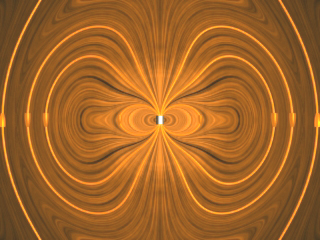
Click on image to start animation |
2
|
Falling Ring Magnetic Field Demonstration
The animation shows the magnetic field configuration around a conducting non-magnet ring (e.g. copper) as it falls under gravity in the magnetic field of a fixed permanent magnet. The current in the ring is indicated by the moving small spheres in the ring. In this case the ring is light and has zero resistance, and levitates above the magnet. The motions of the field lines are in the direction of the local Poynting flux vector.
|
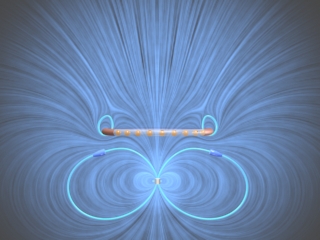
Click on image to start animation |
3
|
Magnetic Field Series Wires
The animation shows the magnetic field configuration around two wires carrying current in opposite directions. The Maxwell stresses associated with the magnetic fields cause the wires to feel a mutual repulsion, and the spread apart as a result.
|
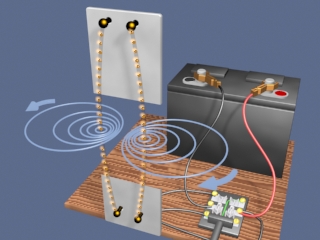
Click on image to start animation |
4
|
TeachSpin Apparatus
The animation the magnetic field of a permanent magnet suspended by a spring in the TeachSpinTM apparatus, plus the magnetic field due to a current in the top coil. The magnet is fixed so that its north pole points downward, and the current in the coil is counter-clockwise when seen from above. The resulting force on the magnet is upwards, and the magnet moves upward as the current in the coil is increased. The magnet is partially levitated by the magnetic field of the coil.
|
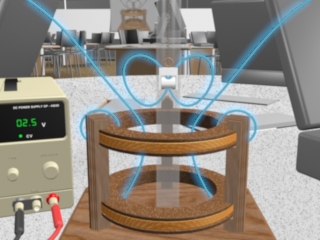
Click on image to start animation |
5
|
Van de Graaff Attraction
An animation of the motion of a negatively charged particle attracted by the positively charged sphere of a van de Graaff accelerator. When the charge is moving away from the sphere and slowing down, its kinetic energy is decreasing and the energy is being stored in the local electric field as that field is stretched. When the charge is moving toward from the sphere and speeding up, its kinetic energy is increasing as the energy previously stored in the stretched field is released.
|
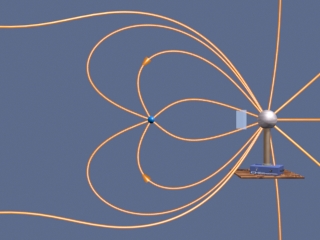
Click on image to start animation |
6
|
Van de Graaff Repulsion
An animation of the motion of a positively charged particle repelled by the positively charged sphere of a van de Graaff accelerator. When the charge is moving toward the sphere and slowing down, its kinetic energy is decreasing and the energy is being stored in the local electric field as that field is compressed. When the charge is moving away from the sphere and speeding up, its kinetic energy is increasing as the energy previously stored in the compressed field is released.
|
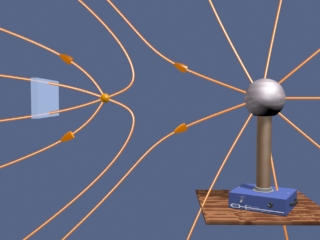
Click on image to start animation |